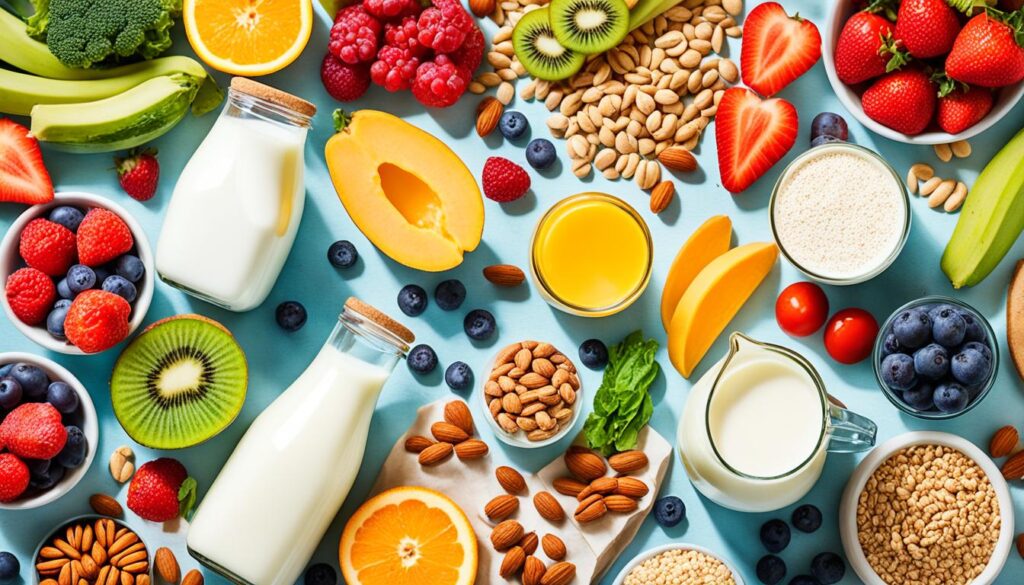Making your lifestyle healthier doesn’t mean you have to turn everything upside down. Small steps taken daily can lead to big changes. Healthy eating habits are more about making smart choices than restricting yourself. By following a nutritious diet plan, you learn the importance of a healthy diet. This knowledge brings benefits of healthy eating into your life. With practical tips for healthy eating, you’ll soon start to feel more energetic and satisfied. Give your body the nourishment it deserves.

Key Takeaways
- Initiate small yet impactful changes to your daily eating habits for improved well-being.
- Incorporate a variety of whole foods into your meals to reap the benefits of a nutritious diet.
- Acknowledge the role of a balanced diet in preventing chronic diseases and elevating energy levels.
- Adopt practical strategies that contribute to a sustainable and healthy diet plan.
- Stay informed about the foods you consume to better manage your health and nutrition.
- Appreciate the connection between mindful eating and increased meal satisfaction.
Understanding the Importance of Healthy-Eating-Habits
The journey to understanding healthy eating is key for improving well-being and energy. Knowing the benefits of healthy eating goes beyond choosing nutritious foods. It’s about seeing how these choices improve your life and health. The impact of healthy eating reaches many parts of our lives, like boosting energy and preventing diseases.
Starting to eat healthily is more than eating salads sometimes. It’s about enjoying a balanced diet that you can keep up. Healthy eating relies on varied foods that give the body needed nutrients. It also means eating mindfully to benefit both body and mind.
The cornerstone of maintaining good health and safeguarding against chronic illnesses lies in the daily food choices we make. Our diet has the power to act as our most potent form of medicine or our slowest form of poison.
Eating nutritious foods can be rewarding and fun. The variety of healthy foods lets us explore many recipes that are good for us. By eating fruits, vegetables, whole grains, proteins, and fats, we enjoy delicious meals and keep our bodies healthy.
Understanding healthy eating also means knowing what our bodies need. We should think about how much and when we eat, and enjoy our meals. Being aware helps us manage weight and avoid eating bad foods.
| Nutrient | Source | Benefits |
|---|---|---|
| Fiber | Whole grains, fruits, vegetables | Supports digestion and satiety |
| Protein | Lean meats, legumes, dairy | Builds muscle and repairs tissue |
| Healthy Fats | Avocados, nuts, olive oil | Enhances brain function and joint health |
| Vitamins & Minerals | Fruits, vegetables, fortified foods | Boosts immune system and prevents deficiencies |
Studies show how important healthy eating is for living longer and avoiding diseases. It’s crucial for a strong immune system and good mental health. The food we eat greatly determines our quality of life.
The Benefits of Reducing Added Sugar in Your Diet
Choosing to reduce added sugar in your diet is a great move for your health. Eating too much added sugar can cause many health problems. It’s important to find and avoid hidden sugars in our food, which can be tricky.
Identifying Hidden Sugars in Beverages
Finding hidden sugars in beverages is like solving a mystery. Sugars hide in drinks like iced teas, flavored coffees, and so-called ‘health’ drinks. To avoid them, read nutrition labels carefully, pick water or unsweetened drinks, and stay committed to your health.
- Scan for sugars: Always review ingredients on beverages for names like sucrose, fructose, and syrup.
- Refresh naturally: Opt for water infused with fruits or herbs for refreshing hydration without the sugar spike.
- Make smart swaps: Replace sweetened drinks with their unsweetened counterparts or sparkling water.

Health Risks Associated with High Sugar Consumption
Eating high-sugar foods and drinks often can cause many health problems. The health risks of high sugar intake include obesity, heart disease, diabetes, and liver diseases. Knowing these risks is the first step towards improving your health.
- Combat obesity: A mindful diet low on added sugars can help manage weight effectively.
- Prevent chronic disease: Mitigate the risk of diabetes and heart conditions with balanced sugar consumption.
- Protect liver health: A reduction in sugar intake can support liver function and stave off related disorders.
Being mindful about reducing added sugar is more than a diet change. It’s a full lifestyle shift. It shows a dedication to your health and fighting chronic diseases. The path might be hard, but the health benefits are truly worth it.
Integrating Probiotics Through Fermented Foods
In the journey to better gut health, adding probiotics is essential. These living microorganisms bring health benefits when taken in right amounts. To add these good bacteria to your diet, explore the variety of fermented foods. Fermentation is an ancient method that keeps food from spoiling. It also adds probiotics and boosts nutritional value.
Fermented foods are common across different cultures and offer unique tastes. Gut health improves with the variety from the spicy Korean kimchi, tangy German sauerkraut, to creamy Greek yogurt. These foods can be eaten alone, as toppings, or with other dishes.
Research supports the health advantages of these tasty options. Probiotics help with digestion, strengthen the immune system, and even uplift our mood. It’s important to maintain a good internal flora for overall well-being.
The table below lists some fermented foods, their probiotics, and health benefits. This can help you improve your diet for better gut health:
| Fermented Food | Probiotic Strains | Health Benefits |
|---|---|---|
| Kimchi | Lactobacillus kimchii, Lactobacillus plantarum | Promotes digestion, supports immune function |
| Sauerkraut | Leuconostoc spp., Lactobacillus spp. | Enhances gut flora, rich in vitamins |
| Yogurt | Lactobacillus bulgaricus, Streptococcus thermophilus | Improves lactose intolerance, strengthens bones |
| Kombucha | Saccharomyces spp., Gluconacetobacter spp. | Detoxifies the body, provides antioxidants |
When adding probiotics to your meals, remember moderation is key. Too much fermented foods might cause discomfort. Introduce them slowly to make them a healthy part of your diet for excellent gut health.

To conclude, including probiotics from fermented foods can significantly help those looking for better gut health. Begin with small portions and pay attention to how your body reacts. With these probiotic-rich foods, you’re on your way to a healthier and happier gut.
Incorporating Omega-3 Rich Fish Into Your Meals
Eating omega-3 rich fish is key to a heart-healthy diet. These fish, like salmon and mackerel, are tasty and good for your heart. They contain heart health boosts and reduce the risk of heart problems. Make sure to eat them regularly for better health.

We will look at the benefits of these fish. And, we’ll show how much you need to eat for the best nutrition.
Benefits of Omega-3 Fatty Acids for Heart Health
Eating omega-3 rich fish brings lots of health benefits. Omega-3s can lower blood pressure and reduce fats in your blood. They help keep arteries clear. This means your heart works better, lowering the risk of heart problems.
Omega-3s are also good for your brain and joints. Adding them to your diet helps your whole body.
Recommended Weekly Fish Intake for Optimal Nutrition
Adults should eat fish rich in omega-3s at least twice a week. A serving size is 3 to 4 ounces of cooked fish. Eating this amount improves heart health and follows good eating guidelines.
“Omega-3s are integral to heart health. Including fish in your diet a couple of times a week is an easy, delicious way to keep your heart strong and healthy.”
For a balanced diet, try different types of omega-3 rich fish in your meals. This adds variety and many health benefits. Eating well is enjoyable and great for your health.
Choosing Fresh Cuts of Meat Over Processed Alternatives
When looking to eat healthier, fresh cuts of meat are key for improving nutrition. Processed meats are convenient but have additives that we should eat less of. So, what makes fresh meats better than processed ones? Here are the main reasons to choose fresh over processed.

Fresh cuts of meat don’t have a lot of sodium or preservatives like nitrates. These are in processed meats and can lead to health issues like high blood pressure and heart disease. Fresh meats are rich in nutrients without the bad extras, making them a healthier choice.
| Meat Type | Key Nutrients | Considerations |
|---|---|---|
| Chicken (Skinless, Breast) | High in protein, Vitamin B6 | Low in fat, versatile |
| Beef (Lean, Sirloin) | Rich in protein, Iron, Zinc | Choose grass-fed for optimal benefits |
| Turkey (Ground, Breast) | High in protein, Selenium | Leaner option, great for ground meat dishes |
At first, processed meat alternatives may look like easy choices. But we should think about their long-term impact on our health. Popular items like bacon and deli meats have preservatives that can harm our health if we eat them often.
Tip: When in doubt, choose options labeled as “no nitrates added” or “minimally processed”. But the healthiest choice is to pick fresh cuts whenever you can.
- Choose meat from trusted sources for the best quality and safety.
- Add different fresh meats to your diet to get many essential nutrients.
- Pairing plant-based proteins with meat is also a great way to balance your diet.
By choosing fresh cuts of meat over processed meat alternatives, you’re doing something great for your health today and in the future. This choice is good for you and the planet, as less processed foods usually have a smaller environmental impact.
The Role of Milk in an Adult’s Diet
Milk in an adult diet is often seen just for kids, but it’s much more. It is essential for adults too, providing necessary nutrients. Its role in adult nutrition is important and often not fully recognized.

Milk is a must for adults who are active and care about their health. It has proteins that help muscle growth and repair. Plus, it’s packed with calcium for strong bones and teeth.
Milk also has potassium, phosphorus, and vitamins D and B12. These are key for a balanced diet. Making milk a part of your daily routine is smart. You can drink it, add it to smoothies or use it in cooking.
| Nutrient | Importance in Adult Diet | Content in 8oz of Whole Milk |
|---|---|---|
| Calcium | Essential for bone health and prevention of osteoporosis. | 276 mg |
| Protein | Supports muscle repair and growth. | 8 grams |
| Vitamin D | Facilitates absorption of calcium and supports immune function. | 100 IU |
| Potassium | Regulates blood pressure and heart health. | 322 mg |
| Vitamin B12 | Important for red blood cell formation and neurological function. | 1.1 mcg |
| Magnesium | Crucial for muscle and nerve function, blood glucose control. | 24 mg |
In conclusion, milk in an adult diet is key well beyond our early years. It is a staple food due to its nutritional benefits. Let’s value milk for its health perks, not just its taste from the past.
Snacking Smart with Fruits for Sustained Energy
Making smart snacking with fruits a habit can boost your energy all day. Fruits are sweet and full of fiber, unlike processed snacks. This keeps your blood sugar stable. It also gives your body the nutrients it needs to work well. Let’s look at the health perks of eating fruits every day and how to pick the best ones for snacks.

Health Advantages of Regular Fruit Consumption
Eating fruit daily is full of benefits. It can help prevent illnesses and aid digestion because of the fiber. Fruits have vitamins and antioxidants that help your immune system. They give you energy and can also reduce the risk of long-term diseases.
Choosing the Right Types of Fruit for Snacking
When choosing fruits for snacking, variety is key. Go for fruits that are filling and nutritious but low in calories. Berries, apple slices, and bananas are great choices. Whether you choose fresh, dried, or frozen fruits, avoid those with added sugars or preservatives. This will help you get the most benefit.
| Fruit | Type | Nutritional Benefits | Snack Tips |
|---|---|---|---|
| Apples | Fresh | High in fiber, vitamin C | Pair with almond butter for a filling snack |
| Bananas | Fresh | Potassium, vitamin B6 | Freeze and blend for a creamy cool treat |
| Blueberries | Frozen | Antioxidants, vitamin K | Add to yogurt or oatmeal for natural sweetness |
| Cherries | Dried | Fiber, vitamin A | Combine with nuts for a homemade trail mix |
| Oranges | Fresh | Vitamin C, potassium | Perfect mid-morning snack, easy to carry |
Picking the right fruits for snacking is an easy way to eat more nutrients. It’s a step towards a healthier life. You can enjoy a range of tasty flavors from nature.
Boosting Meal Satisfaction with Vegetable Inclusion
Adding vegetables to your meals does more than just increase nutritional value. It turns a simple meal into something special. Boosting meal satisfaction comes easy with the crunch of bell peppers or the sweetness of roasted carrots. Vegetables bring exciting colors, tastes, and textures to your plate. They are packed with essential nutrients like fiber, vitamins, minerals, and antioxidants.
Veggies are key for a balanced diet, not just an extra. They add fiber and volume, making you feel full. This is especially good if you’re watching your calorie intake. Compare a regular chicken and rice lunch to one with spinach, tomatoes, and zucchini. The vegetable inclusion in meals makes your meal more fulfilling. You’ll feel satisfied and energetic for hours after you finish eating.
Adding vegetables to your meals is easy and rewarding. Try to have vegetables cover half your plate at lunch and dinner. Begin your day with a vegetable omelet or a leafy greens smoothie. These small changes can improve your meals’ taste and your health. Remember, a plate full of vegetables is not just pleasing to the eye. It’s also a step towards a healthier lifestyle, offering both great taste and nutritional balance.